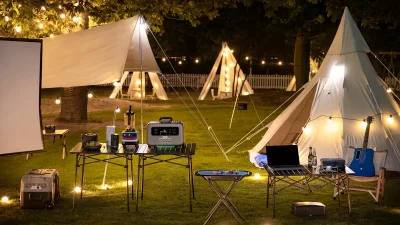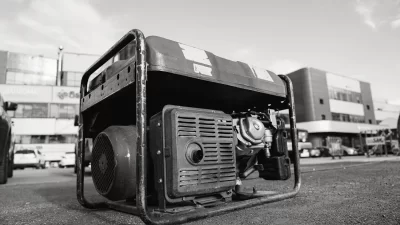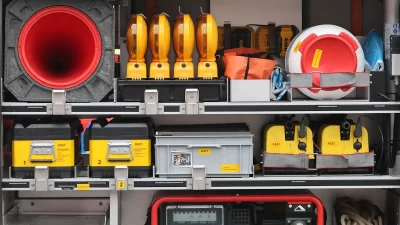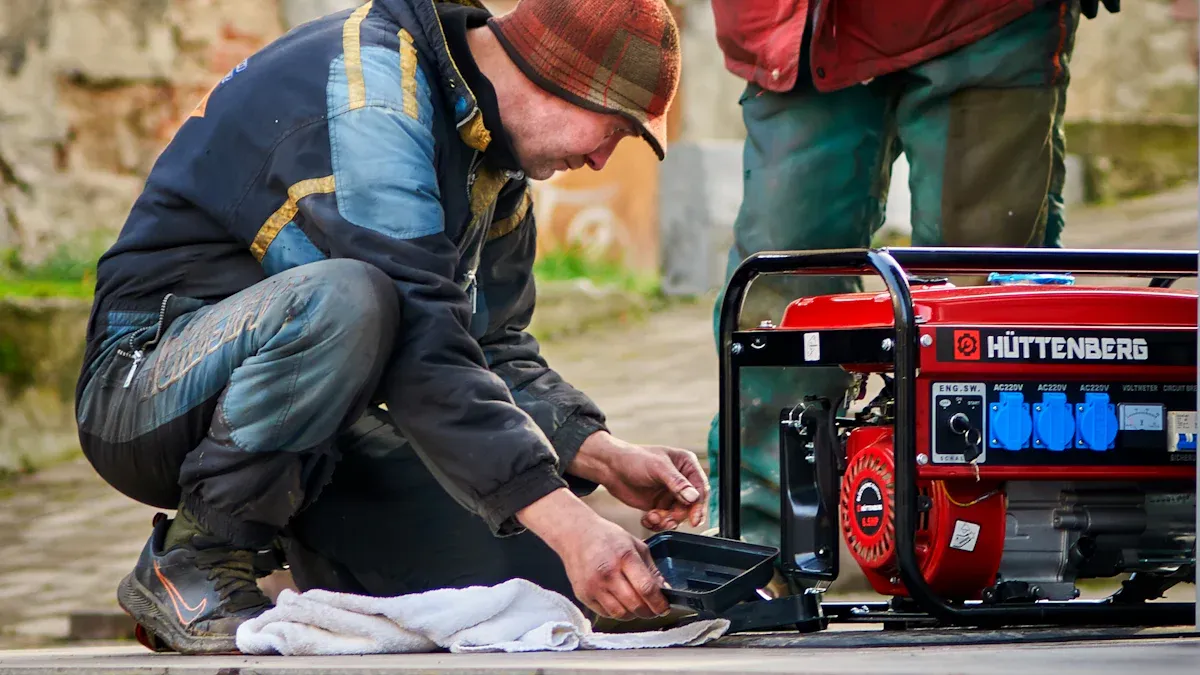
You want power that is quiet and easy to move. You also want it to work well anywhere you go. Used generators can work great and cost less than new ones. If you pick a generator that is well taken care of, it is less likely to break. It only has a 20% chance of failing in two weeks. But if the generator is not cared for, it might break in just two days. It has a 50% chance of failing in 48 hours. Inverter technology helps your generator run quietly. It also gives you safe and clean power for your things. Think about how much power you need. Also, think about where you will use it. This will help you find the best one for you.
Hal-hal Penting yang Dapat Dipetik
Pick used generators from trusted brands like Honda, Generac, and Yamaha. These brands give you power that is quiet and reliable. Inverter generators are quiet. They use less fuel. They give safe electricity for sensitive devices. Find portable models with handles and wheels. They should weigh less than 60 pounds. This makes them easy to move and set up. Always check the condition of a used generator. Look at its maintenance history. Test it before you buy it. This helps make sure it works well. Follow safety rules and do regular maintenance. This keeps your generator working and keeps you safe from harm.
Best Used Generators
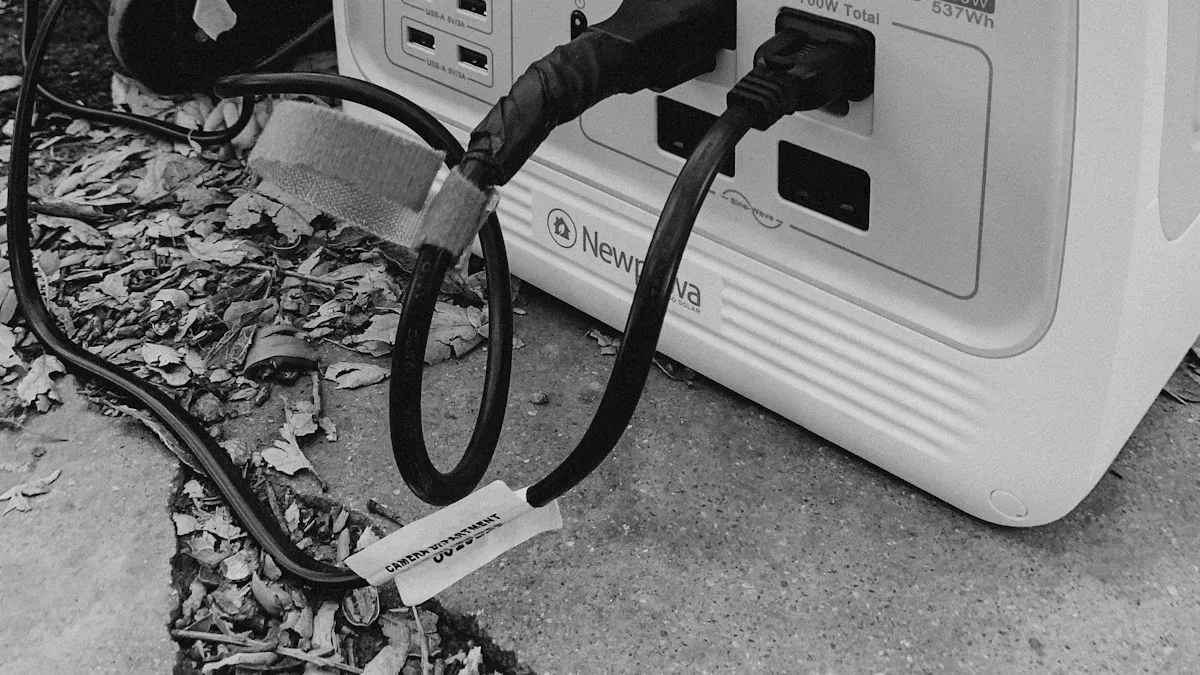
Top Picks
You want a generator you can count on. The best used generators are from brands people trust. These brands have good reviews and work well for a long time. Honda is known for the EU2200i model. It is quiet, strong, and easy to carry. Generac is also a top brand for trust and how well it works. Many people like that it runs quietly and has good safety features. Yamaha gives steady power and uses inverter technology. Westinghouse costs less but still works well.
Here are some top brands and models you should look at:
Honda: The EU2200i is quiet and dependable. You can use it for camping, RVs, or as backup at home.
Generac: People trust this brand. It has safety features like CO sensors. Many models are easy to move and run quietly.
Yamaha: Makes inverter generators that are small and light. You get clean power for things like computers.
Westinghouse: Gives you good value and works well. Many models have wheels and handles so you can move them easily.
Briggs & Stratton: Has strong engines and lasts a long time. The PowerSmart series is great for taking with you.
Powerhorse: Is a good choice for value and trust. Engine Smart Control helps save fuel.
A-iPower: This brand is newer. It has low-cost, reliable choices. Many models are ready for RVs and have GFCI safety.
🏆 Tip: Pick a generator from a brand people trust. You will get better help and it will work when you need it.
A study in 2025 asked 4,838 people in the U.S. about portable generators. The study used the Net Trust Quotient Score (NTQS) to see which brands people trust most. This score shows which brands have the best quality and work well for used generators.
Rank | Brand | Net Trust Quotient Score | Consumer Rating |
|---|---|---|---|
1 | Generac | 115.4 | ★★★★★ |
2 | Honda | 114.5 | ★★★★★ |
3 | DeWalt | 107.4 | ☆☆☆ |
4 | CAT | 106.8 | ☆☆☆ |
5 | Yamaha | 106.4 | ☆☆☆ |
6 | Craftsman | 106.0 | ☆☆ |
7 | Briggs & Stratton | 105.7 | ☆☆ |
8 | Westinghouse | 98.0 | ☆☆ |
9 | Champion | 97.5 | ☆☆ |
10 | Ryobi | 97.0 | ☆☆ |
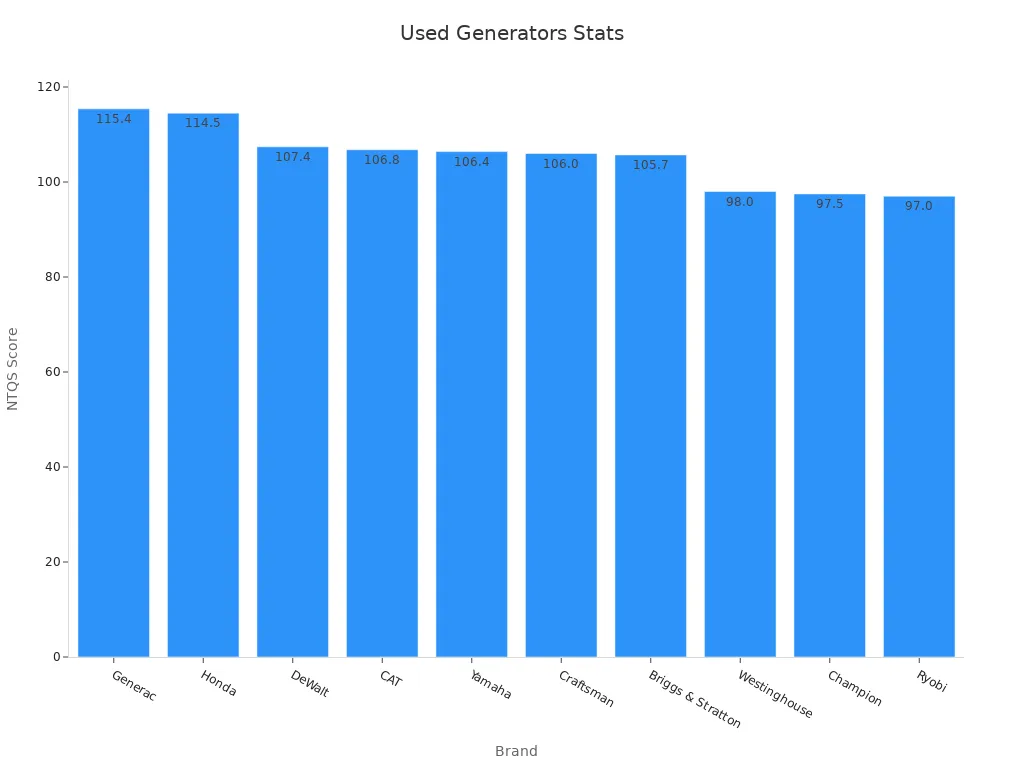
Key Features
You want a generator that is quiet, easy to move, and strong. Inverter technology helps make this happen. Inverter generators are not very loud. They sound like people talking. You can use them at home, in your RV, or while camping. They will not bother others. Many models have CO sensors for safety. These sensors turn off the generator if they find too much carbon monoxide.
It is important to move your generator easily. Look for models with handles and wheels. You can take them anywhere you need power. Most inverter generators weigh less than 60 pounds. You can lift them without help.
Power output is also important. Inverter generators usually give 1,000 to 4,000 watts. This is enough for lights, small machines, and electronics. Some models let you connect two together for more power.
Here is a simple chart to compare inverter and regular generators:
Feature | Inverter Generator | Conventional Generator |
|---|---|---|
Noise Level | Quiet, about 50-60 dB | Loud |
Portability | Small, light, has handles | Big, heavy |
Power Output | 1-4 kW, can connect two | Usually bigger units |
Fuel Efficiency | Changes speed to save fuel | Runs at same speed |
Suitable Uses | Camping, homes, electronics | Work sites, big tools |
🔋 Note: Inverter generators give you safe, steady power. You can use them for laptops, phones, and other sensitive things.
You get the best results with used generators from trusted brands. Look for inverter technology, quiet running, and safety features. You will have power you can trust anywhere.
Why Choose Inverter Generators
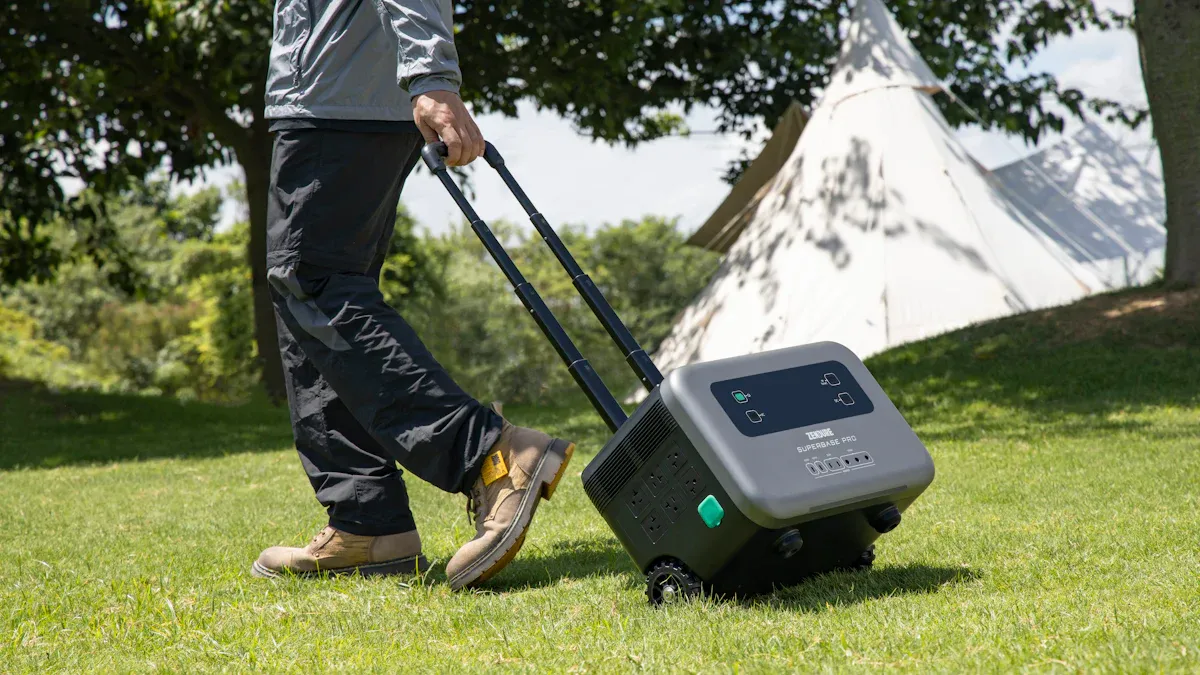
Quiet Operation
You want a generator that does not make much noise. Inverter generators are much quieter than regular ones. Most of them make between 50 and 60 decibels of sound. This is softer than people talking. You can use them at a campsite or in your yard. They will not bother your friends or neighbors.
Source / Model | Noise Level (dB) | Context / Notes |
|---|---|---|
Typical quiet inverter generators | 50-60 dB | Quieter than normal conversation (60 dB) |
Honda 2200-Watt inverter | 48-57 dB(A) | Portable, great for camping and outdoor use |
Westinghouse iGen4500 | 52 dB(A) | Gasoline, quieter than normal conversation |
Hair dryer | 90 dB | Much louder than inverter generators |
Inverter generators have special mufflers and smart engine controls. These parts help make the generator quieter. They change the engine speed and block extra noise. You get power without the loud sound of old generators.
🔇 Tip: Pick an inverter generator if you want things to stay quiet and calm.
Clean Power
You need safe power for your electronics. Inverter generators give you steady and clean electricity. They use electronic parts to keep the voltage and current safe. This keeps your laptops, phones, and TVs from getting damaged.
Inverter generators make power with less distortion. This helps protect your sensitive devices.
They use voltage regulators and inverters for smooth electricity.
Lab tests show they meet tough rules for voltage and current. These rules include UL 1741 and IEEE 1547.
You can trust inverter generators to keep your devices safe.
Portability
You want a generator that is easy to move. Inverter generators are light and small. Many have handles or wheels. You can take them to a campsite, tailgate, or job site with no problem.
Most inverter generators weigh under 60 pounds.
Their small size fits in your car or RV.
You can set them up fast wherever you need power.
🚗 Note: Choose an inverter generator for easy moving and setup. You will have power wherever you go.
Used Generators: What to Look For
Noise Level
You want a generator that keeps things peaceful. Always check the noise rating before you buy. Most noise ratings use decibels (dB) measured at 23 feet (7 meters). A normal conversation is about 60 dB. Many portable generators run between 65 and 80 dB. Inverter models are quieter, often below 60 dB. Remember, a 10 dB jump means the sound is about twice as loud to your ears. Compare noise levels only between generators with similar power. Also, check if the test used the same distance and load. Hard surfaces make generators sound louder, while grass or dirt can help absorb noise.
🔇 Tip: Check your local noise rules. Some places limit how loud your generator can be.
Power Output
You need enough power for your devices. Look at the generator’s watt rating. This tells you how much it can handle. Ratings like eKW, kVA, and standby power show the limits. You can test a used generator by running it at full load and measuring the output. Some tools, like the Generator Scorecard, compare real-world performance. Always match the generator’s power to your needs. Too little power means your devices may not work. Too much power wastes fuel.
Portability
You want a generator that is easy to move. Look for models with wheels and handles. Most inverter generators weigh less than 60 pounds. You can lift or roll them without help. Small size means you can fit them in your car or RV. If you plan to travel or camp, portability matters even more.
Handles and wheels make moving easy.
Lightweight models save your back.
Compact size fits tight spaces.
Keandalan
You need a generator that works every time. Check the maintenance history. Ask for records of oil changes, filter swaps, and battery checks. Reliable brands like Onan, Kohler, and Generac have strong support networks and trained technicians. Kohler ranks highest for dependability, but all brands need regular care. Look for signs of good upkeep, like clean parts and recent service. A trusted seller or dealer gives you more peace of mind.
🛠️ Note: A well-maintained generator lasts longer and saves you money.
When you shop for used generators, focus on noise, power, portability, and reliability. These steps help you pick a generator that fits your needs and keeps you powered up anywhere.
Evaluating Condition
Physical Inspection
You need to check your generator before buying it. Look closely at the outside for any rust, dents, or cracks. Check the frame, fuel tank, and engine for these problems. See if there are leaks near the oil, fuel, or coolant spots. Leaks can mean the generator was not cared for well. Look at the alternator and wiring for any damage or loose wires. A clean generator usually means the owner took good care of it.
Look for rust, dents, and cracks.
Check for leaks from oil, fuel, or coolant.
Check the alternator and wires for damage.
Make sure all covers and panels are tight.
🛠️ Tip: Use a flashlight to help you see hidden leaks or damage.
Some experts use special tools to check generators. They use Electrical Signature Analysis and temperature checks. These tools help find problems early, like issues with stator windings. You do not need these tools, but looking carefully can help you avoid big repairs.
Engine Hours
Engine hours show how much the generator has been used. Fewer hours usually mean less wear. But you should also look at the maintenance records. Ask for logs that show oil changes, filter changes, and repairs. A generator with more hours but good care can last longer than one with low hours and bad care. Look for records that follow NFPA 110 rules. These rules say the generator should be tested and cared for often.
Check the maintenance logs and service records.
Compare the engine hours to the generator’s age.
Look for missed care, like dirty filters or old oil.
A good history shows the generator was used and cared for right. This helps you feel better about buying it.
Test Run
You should always test a used generator before buying. Start the engine and listen for strange sounds or smells. Make sure it starts easily and runs smoothly. Run it with a load to see if it can give enough power. If you can, use a load bank test. This test checks if the generator keeps power steady when working hard.
Check the battery voltage for easy starting.
Look at the electrical connections to make sure they are tight and clean.
Do a load bank test to see if it can handle power needs.
Watch the temperature and listen for odd sounds.
Look at old test results and repair logs.
✅ Note: A test run helps you know if the generator works well. Good used generators pass these tests and make you feel safe.
Safety and Maintenance
Safe Use
You must always use your generator the right way. Put your generator outside, at least 20 feet from your house or tent. Never use it inside or close to windows and doors. Carbon monoxide from generators is very dangerous. It kills about 85 people in the U.S. each year. Most of these deaths happen at home. Always point the exhaust away from where people live. Install CO and smoke alarms for extra safety. Use grounded cords and GFCI outlets to stop electrical shocks. Keep your generator away from where people gather. Make sure anyone nearby wears hearing protection.
⚠️ Tip: Always look for automatic shut-off switches and CO sensors. These features can save lives.
Aspect | Details |
|---|---|
Keep portable generators away from work or gathering spots. Make sure people nearby wear hearing protection. | |
Maintenance Tasks | Check and clean your generator often. Change the oil and filters. Lubricate moving parts. Check the voltage regulator. Watch the fuel quality. |
Common Issues | Fuel filters can get clogged. Parts may break if not oiled. The voltage regulator can be set wrong. The engine speed governor may not work right. |
Benefits of Maintenance | Good care makes your generator last longer. It works better and saves money by stopping big repairs. It also keeps you safe and follows rules. |
Outsourcing Benefits | Letting experts do maintenance saves time and money. They fix problems fast and know what to do. They can also help with fuel and other needs. |
Routine Care
You want your generator to work when you need it. Follow a simple care plan. Start and run your generator once a week. Check for leaks and make sure there is enough fuel. Every month, look at the oil, coolant, and battery. Watch for bugs and trash. Twice a year, check the belts, exhaust, air filters, and wires. Once a year, change all filters and spark plugs. Flush the coolant and do a load test. This care keeps your generator ready and strong.
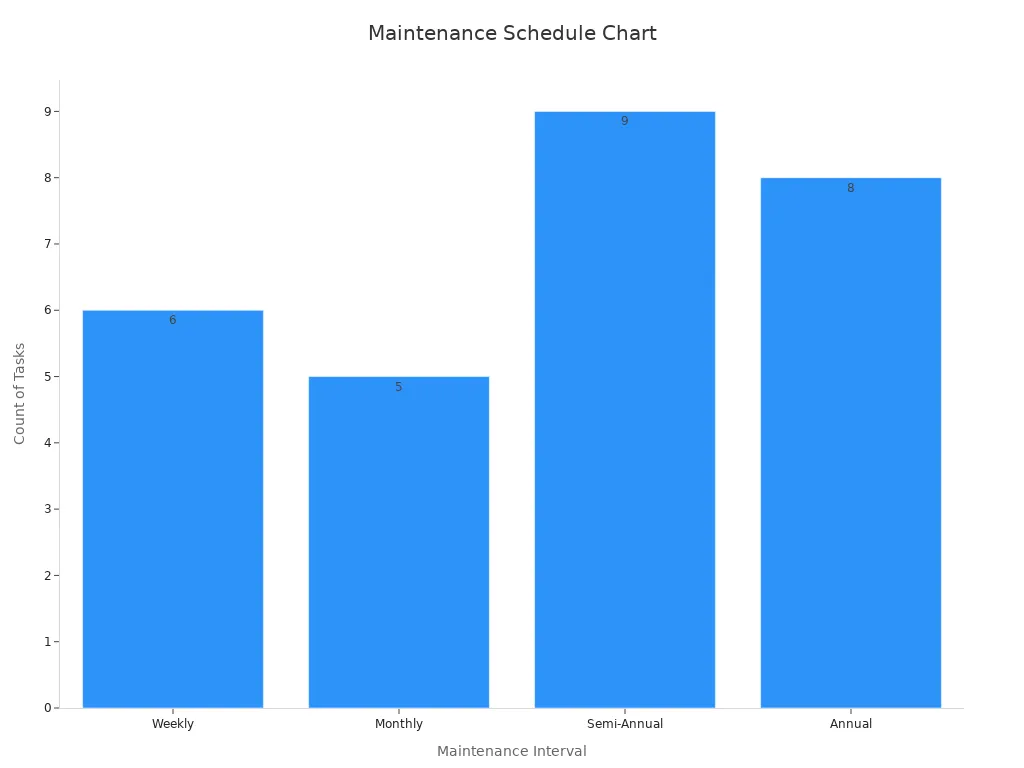
🛠️ Note: Taking care of your generator saves money and stops breakdowns.
Storage Tips
Storing your generator the right way keeps it safe. Clean your generator to get rid of dirt and oil. Take out the battery and keep it in a cool, dry place. Store your generator inside, away from things that can catch fire. Cover it with a tarp or generator cover to keep out dust and water. Put it on a pallet so water cannot reach it. Run the generator until the fuel tank is empty. If you cannot empty it, use a fuel stabilizer. Always check and fill the oil before you store it. Lock your generator so no one can steal it.
Clean the generator and take off any trash.
Take out the battery and store it alone.
Keep it inside in a dry, airy place.
Cover it with a tarp or generator cover.
Put it on a pallet to keep it dry.
Run it until empty or use fuel stabilizer.
Lock your generator to keep it safe.
🔒 Tip: Storing your generator the right way keeps it clean, safe, and ready to use.
You want power that is quiet and easy to move. Inverter technology gives you safe energy you can trust. If you check each generator closely, you will not waste money. Use the tips and tables to help you pick the right one. You can find used generators that fit your needs and cost less. Start looking now or ask an expert for help. You can get reliable power when you need it!
PERTANYAAN YANG SERING DIAJUKAN
How quiet are inverter generators compared to regular ones?
Inverter generators are much quieter than regular ones. Most make noise like people talking, about 50 to 60 dB. Regular generators are much louder, sometimes twice as loud. You can use an inverter generator at a campsite or at home. It will not bother other people.
🔇 Tip: Always check the dB rating before you buy.
Can I trust a used generator to work when I need it?
A used generator can be trusted if you check it first. Look at its condition and see if it was cared for. Pick a brand that people trust and test it before buying. If it was taken care of, it will give you power when you need it and save you money.
Ask for service records.
Test run before purchase.
What devices can I safely power with an inverter generator?
You can use an inverter generator for laptops, phones, TVs, and small appliances. It gives clean and steady electricity. This keeps your sensitive electronics safe from power surges or drops.
⚡ Note: Always match the generator’s watt rating to your devices.
How do I know if a used generator is easy to move?
Check if the generator has handles and wheels. It should weigh less than 60 pounds. Smaller inverter generators fit in your car or RV. You can carry or roll them wherever you need power.
Feature | What to Look For |
|---|---|
Handles | Foldable or built-in |
Wheels | Sturdy, easy to roll |
Weight | Under 60 lbs |
What safety features should I look for in a used generator?
Look for CO sensors, automatic shut-off, and GFCI outlets. These features help keep you safe from carbon monoxide and shocks. Always use your generator outside and away from people.
🚨 Alert: Safety features save lives. Never skip them.

